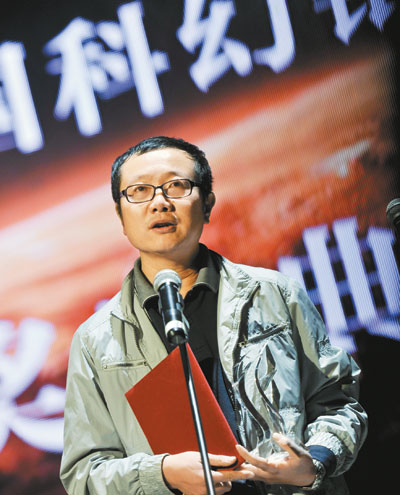|

“THREE-BODY” trilogy author Liu Cixin is bringing his sci-fi world to life as a Tencent mobile game. The popular sci-fi writer now has a new job title — Tencent mobile game imagination architect.
Liu revealed part of his game script for Thunder Fighter, one of the IT giant’s most popular mobile games, at a news conference March 30. The collaboration marks a milestone in the relationship between the literati and game makers in China, according to China Daily.
“Fiction as an art form is gradually fading into the sunset, and the prospects for science fiction depend on fusing with other media, such as film, TV and online games,” said Liu.
The first film adaptation of the “Three-Body” trilogy started shooting in the Lesser Xing’an Mountain in the northeastern province of Heilongjiang last month.
“Science fiction and games are similar to each other because both create an imaginary world where the story develops. If a game emphasizes quality, the setting of the world will be an important element, just as it is in literary works,” says Liu.
Thunder Fighter was released in March 2014. Players take on the role of a pilot named Roy, flying different aircraft and fighting enemies in space.
In the game script, Liu will add parallel universes to the original storyline, in which humans must seek alliances with civilizations in other worlds in order to survive.
Via the powerful social networking platforms of WeChat and QQ, two instant messaging apps owned by Tencent, Thunder Fighter attracted 40 million players in its first month.
According to the game’s project manager Wang Haosu, the majority of players are men under the age of 25.
“They have a great interest in sci-fi themes, and we believe Liu Cixin will provide a worldview that can enhance the game experience of our players,” Wang says.
Zhu Jiayin, a 15-year veteran of the game industry and the founder of Chuapp.com that covers news about mobile games in China, said: “It is the first time a writer who is accepted by mainstream literary circles has cooperated with a game maker.”
Zhu says a similar situation developed in 2004, but it was mostly between game makers and online writers.
“The marriage between Liu and Tencent is more symbolic,” said Zhu, adding that players are less likely to pay attention to the plot of Thunder Fighter than the competitive aspects of the game.
However, it’s still a win-win partnership for Tencent and Liu.
Liu will receive a sizable payment for his script and also reach a large number of potential readers.
In return, Tencent will gain a lot of publicity by hiring Liu as the imagination architect.
Liu’s books have sold more than 1 million copies. The English version of “The Three-Body Problem” has sold more than 20,000 copies since November and was just nominated as a finalist for a top U.S. sci-fi prize, the Nebula Awards.
As one of the major game makers and operators in China, Tencent relies heavily on its gaming sector. According to the company’s annual report, their gaming revenue was 44.7 billion yuan (US$7.2 billion) in 2014, accounting for 56 percent of its annual total revenue.
Other influential online writers previously dabbled in China’s lucrative gaming market.
In 2009, Zeng Yu, better known as Jin Hezai, the author of the popular fan fiction “Biography of Wukong” based on the classic Chinese novel “Journey to the West,” was hired by Tencent to adapt his work as an online game.
Zhang Wei, one of China’s wealthiest authors who writes online under the nom de plume Tangjia Sanshao, invested in the game company Diyibo Network Tech, and had his novel “Ice and Fire of the Magical Kitchen” adapted into a mobile game in 2014.
Xu Lei, who is the author of the famous grave-robber series “Tomb Robbers Journal,” released a mobile game based on the series in 2014.
According to the 2014 China Gaming Industry Report published in December, in the past five years the annual revenue of the country’s gaming market reached 114 billion yuan, and the average growth rate has been more than 30 percent.
“Game creation will probably become a very important form of art and will gradually converge with mainstream culture and occupy more room in people’s lives,” said Liu.
(SD-Agencies)
|

